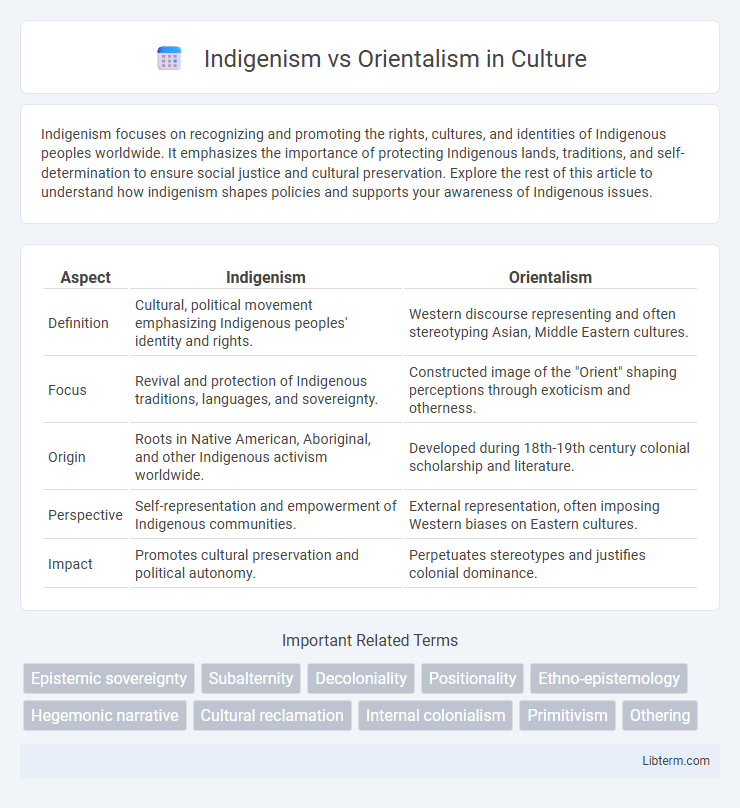Indigenism focuses on recognizing and promoting the rights, cultures, and identities of Indigenous peoples worldwide. It emphasizes the importance of protecting Indigenous lands, traditions, and self-determination to ensure social justice and cultural preservation. Explore the rest of this article to understand how indigenism shapes policies and supports your awareness of Indigenous issues.
Table of Comparison
| Aspect | Indigenism | Orientalism |
|---|---|---|
| Definition | Cultural, political movement emphasizing Indigenous peoples' identity and rights. | Western discourse representing and often stereotyping Asian, Middle Eastern cultures. |
| Focus | Revival and protection of Indigenous traditions, languages, and sovereignty. | Constructed image of the "Orient" shaping perceptions through exoticism and otherness. |
| Origin | Roots in Native American, Aboriginal, and other Indigenous activism worldwide. | Developed during 18th-19th century colonial scholarship and literature. |
| Perspective | Self-representation and empowerment of Indigenous communities. | External representation, often imposing Western biases on Eastern cultures. |
| Impact | Promotes cultural preservation and political autonomy. | Perpetuates stereotypes and justifies colonial dominance. |
Understanding Indigenism: Core Principles and Goals
Indigenism centers on the empowerment and revitalization of indigenous cultures, emphasizing the preservation of native languages, traditions, and rights to self-determination. It challenges colonial narratives by asserting indigenous worldviews as legitimate epistemologies and advocates for social justice, land rights, and cultural sovereignty. Core goals include resisting assimilation, promoting indigenous knowledge systems, and fostering political and cultural autonomy within global frameworks.
Defining Orientalism: Origins and Key Concepts
Orientalism, as defined by scholar Edward Said, originates from Western depictions of Eastern societies characterized by stereotypes of exoticism, irrationality, and cultural inferiority. It serves as a framework used by colonial powers to justify dominance by constructing a binary opposition between the "Occident" (the West) and the "Orient" (the East). Key concepts include essentialism, where Eastern cultures are homogenized, and othering, which marginalizes non-Western identities in art, literature, and academia.
Historical Context: Colonialism’s Impact
Indigenism and Orientalism emerged as distinct frameworks shaped by the historical context of colonialism, where Indigenism centers on reclaiming native identities marginalized by imperial powers. Colonialism imposed Orientalist representations that exoticized and homogenized Eastern cultures, reinforcing power imbalances and Eurocentric worldviews. The tension between Indigenism's emphasis on authentic indigenous narratives and Orientalism's constructed stereotypes highlights the enduring impact of colonial dominance on cultural representation and identity politics.
Representation and Power Dynamics
Indigenism challenges the dominant narratives imposed by Orientalism by emphasizing authentic self-representation and reclaiming cultural identity from colonial distortions. Orientalism often perpetuates power imbalances by framing Eastern societies through a Western-centric lens, reinforcing stereotypes and justifying cultural hegemony. The power dynamics in these frameworks reveal a struggle between imposed external portrayals and indigenous voices striving for autonomy and accurate representation.
Culture, Identity, and Voice: Who Tells the Story?
Indigenism centers on authentic cultural representation by indigenous peoples, emphasizing self-representation and preserving native identities against external distortions. Orientalism, as a Western construct, often exoticizes and stereotypes Eastern cultures, marginalizing native voices and perpetuating biased narratives. The struggle between these frameworks highlights the critical importance of who controls cultural storytelling in shaping identity and reclaiming historical agency.
Knowledge Production: Indigenous vs. Outside Narratives
Indigenism centers knowledge production within Indigenous communities, emphasizing oral traditions, lived experiences, and local epistemologies as valid sources of truth. Orientalism often imposes external perspectives that exoticize and stereotype Eastern cultures, prioritizing Western academic frameworks over Indigenous voices. This clash shapes the production and validation of knowledge, with Indigenism advocating for decolonized methodologies and self-representation against Orientalism's hegemonic narratives.
Case Studies: Indigenism in Contemporary Movements
Indigenism in contemporary movements emphasizes the reclamation of native identities and cultural heritage through community-led initiatives, such as the Zapatista uprising in Mexico and the Idle No More movement in Canada. These case studies highlight the struggle against colonial narratives and the assertion of indigenous sovereignty, contrasting Orientalism's external exoticization and stereotyping of non-Western cultures. By centering indigenous voices and epistemologies, indigenism fosters political empowerment and cultural revitalization within global discourses on identity and rights.
Orientalism in Modern Media and Academia
Orientalism in modern media and academia often perpetuates stereotypical representations of Eastern cultures through exoticism and essentialism, reinforcing Western-centric narratives. Academic discourse reveals how Orientalist frameworks shape the portrayal of the Middle East, South Asia, and East Asia, influencing policy, literature, and visual culture. Critical scholarship challenges these paradigms by highlighting the power dynamics embedded in Orientalist knowledge production and advocating for nuanced, decolonized perspectives.
Resistance, Reclamation, and Indigenous Empowerment
Indigenism challenges Orientalism by resisting colonial narratives and reclaiming Indigenous identity through cultural revitalization and linguistic preservation. This resistance empowers Indigenous communities to assert self-determination, protect ancestral lands, and reshape historical discourse. Empowerment is further enhanced by Indigenous-led sovereignty movements and education systems that prioritize traditional knowledge and worldview integration.
Toward Decolonizing Mindsets: Bridging Theory and Practice
Indigenism advocates for reclaiming indigenous knowledge systems and cultural identities to challenge colonial legacies, while Orientalism critiques Western representations that distort Eastern societies through exoticization and stereotyping. Bridging theory and practice in decolonizing mindsets involves integrating indigenous epistemologies into educational curricula, policy-making, and social movements to disrupt hegemonic narratives. Emphasizing participatory approaches ensures that decolonization efforts reflect lived experiences and foster genuine intercultural dialogue.
Indigenism Infographic

 libterm.com
libterm.com